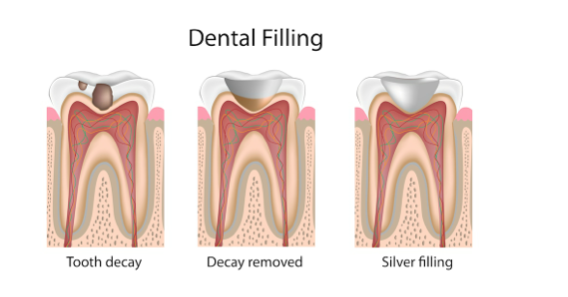 By Dr. Alicia Cook, Community Dental Farmington
By Dr. Alicia Cook, Community Dental Farmington
Everyone’s mouth contains thousands of bacteria that use the sugar that we eat and turn it into acid. When the bacteria on your teeth create acid, this makes soft holes in your teeth called “cavities” or “decay”. Bacteria love to stick to your teeth and hide in areas that are hard for you to clean, like in between your teeth and in the pits and grooves on your teeth.
While it is more difficult for bacteria to stick to the smoother areas on your teeth, they can cause cavities on any part of your tooth if you let them stay there for too long. Plaque is a collection of bacteria and food that builds up on your teeth. If your teeth are covered in plaque, you are much more likely to get cavities. This is why brushing and flossing are so important. Brushing your teeth twice a day for 2 minutes will brush the bacteria and food off of your teeth and flossing once a day will make sure none are still hiding in between your teeth. Although there are other factors that can make you more likely to get cavities, they are almost 100 percent preventable with the right diet and home care.
When the dentist finds a cavity in your tooth, this means that you have a hole in your tooth that is full of acid-producing bacteria working to make the hole even bigger. It is the dentist’s job to remove the damaged tooth structure and to put in a filling to replace the part of the tooth that was removed. A filling is like a puzzle piece that the dentist shapes to fit the hole in your tooth. Sometimes, the damage to your tooth can be so extensive that the bacteria can reach the inner layer of your tooth, the nerve and blood vessel filled “pulp,” and cause severe pain and infection. In this case, your tooth can be saved with a root canal, which is a procedure where the affected pulp is removed from your tooth in order to get you out of pain and to prevent you from losing your tooth. However, if the tooth decay is too large the dentist may not be able to salvage your tooth and it may need to be extracted to get you out of pain.
Good home care such as brushing and flossing will help minimize your risk for decay and help you keep your teeth for a lifetime.
It is important to know that even though you may have had your teeth “fixed” by your dentist in the past, you are actually more likely to get a new cavity around a filling than in a healthy tooth. Even though it is the dentist’s job to help to fix your teeth, it is still just as important for you take good care of the work they have done by keeping your teeth clean and healthy.
Community Dental Farmington is located at 131 Franklin Health Commons Ste i, Farmington, ME . Telephone: 207-779-2659 / fax: 207-779- 2697. Community Dental improves the lives of children and adults in our communities by providing needed, accessible, comprehensive quality oral health care. For further information please visit our website at www.communitydentalme.org
Support for the Franklin Children’s Oral Health Project is provided by the Maine Oral Health Funders.




